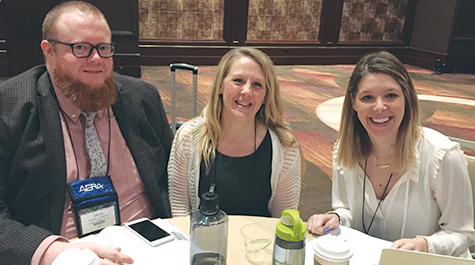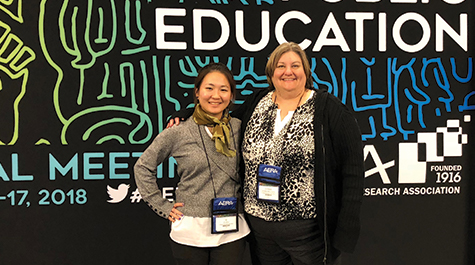Doctoral students present research at AERA
The William & Mary School of Education sent a sizable delegation to the annual meeting of the American Educational Research Association (AERA) this year. Considered the largest gathering of scholars in the education research field, the five-day conference convened approximately 14,000 participants in New York City in April.
Nine faculty members and six doctoral students from the school presented their research at the conference. For the students, it was an invaluable opportunity to connect with fellow researchers and share their own work in a high-profile venue. Below, we offer a look at three of the research projects students presented at AERA.
Focused on the Family: Cultural and Structural Deficit Ideologies in District Policy Making
Noël Williams, Leah Horrell and Davis Clement, all doctoral students in K-12 leadership, presented their work exploring how district-level policies are often biased toward traditional family structures and parental involvement. The project grew out of an educational planning course with Leslie Grant, associate dean of academic programs, in which they examined school districts’ strategic plans. After the course ended, the three students decided to continue the project independently, focusing on the language used in the plans and the cultural norms it reflected.
“We wanted to determine how the language of district strategic plans might reconstruct racism and inequality,” said Horrell.
The students conducted a critical discourse analysis of strategic plans from a sample of the 100 largest school districts in the U.S. Their research confirmed that frequently, these policies assumed and promoted an idealized construction of parent involvement based on white cultural norms and offered an implicitly deficit-based view of alternative modes of parental involvement.
“These findings have dire implications for districts with diverse student populations, especially large districts whose practices are more visible and potentially influential for other leaders looking to scale popular approaches to their own districts,” said Horrell.
The students are continuing their research, with plans to examine how corporations and marketing influence the discourse of strategic plans.
Relationships Among Organizational Citizenship Behavior, Principal Support, and Student Achievement: Implications for Administrative Practice
Clement also participated in a second presentation on the topic of school leadership, along with Chancellor Professor Mike DiPaola and visiting scholar Ufuk Erdogan. Clement and DiPaola have been studying how leadership strategies by principals in K-12 schools can impact student achievement.
“We are really trying to broaden the concept of principal leadership to include more than technical, supervisory, and evaluative responsibilities,” said Clement. “Our findings show how strongly student achievement correlates with teacher perceptions that they are respected by their principal. When teachers’ emotional needs are met, teaching likely improves.”
Their study aimed to identify the kinds of actions school leaders can take to elicit organizational citizenship behaviors by teachers — the kind of above-and-beyond contributions that make a significant impact on student learning. Their findings suggest that social and emotional support for teachers is of utmost importance, even more than traditional supports such as resources, time and feedback.
Clement and DiPaola plan to continue their work studying school climate and leadership, including organizational citizenship and academic optimism. “Studying these constructs can show school leaders a more holistic set of measurable outcomes in schools than standardized student achievement scores,” said Clement.
Women in Academia: The Lived Experiences of Selected Mid-Career Women Faculty in STEM
Both doctoral students in higher education, Yi Hao and Donna Milligan presented their work exploring the challenges and opportunities of mid-career women faculty in STEM fields. The project grew out of their course focused on qualitative research and design, led by Judi Harris, Professor and Pavey Family Chair in Educational Technology.
“We tried to portrait the lived experiences of these women faculty,” said Hao. “It is a small sample of six but through a qualitative approach, we are trying to get rich and thick descriptions that capture the nuances of their professional development in mid-career.”
For all of the students attending AERA, it was an opportunity to connect with the wider research community. “For future faculty, going to AERA is necessary to locate yourself in the big picture of educational research, to find your kindred spirits in the scholarly realm,” said Clement.

